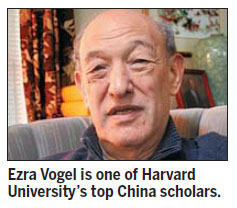Watcher follows path of nation's reform
Updated: 2013-03-13 07:12
By Chen Weihua in Washington (China Daily)
|
||||||||

One of Harvard University's top China scholars, Ezra Vogel, has been keeping an eye on the annual sessions of the National People's Congress and the Chinese People's Political Consultative Conference. This year's NPC is especially important because it is selecting new government leaders for the next decade.
Vogel, author of the 2011 book Deng Xiaoping and the Transformation of China, is pleased that the Chinese edition of the book came off the press in January, just as the new administration was taking shape.
"The book tells the story of reform and opening-up. Some leaders are using the book to promote the next phase of reform and to increase public discussion of certain issues. I am honored to be used in this way," Vogel told China Daily.
Vogel, who spent 10 years on the book, which explores the life of the key architect of China's reform and opening-up, is aware that there are different views in China about his book, but he is happy that people who want more discussions of reform are in a strong position.
Vogel said that although the planning for the new administration has not yet been completed, he has seen some good signals.
These include a trip to Shenzhen, China's first special economic zone, by Xi Jinping in December, less than a month after he took the post as general secretary of the Communist Party of China Central Committee.
"Of course it's good for me personally," Vogel laughed, "for it called attention to Deng Xiaoping, but the important point is that it is good for the country. The trip showed Xi wanted to continue the path of reform."
Vogel said many people in China feel that the pace of reform has slowed in the past few years and needs to be picked up.
"If reforms were easy, any leader could make them. But I think Xi will push harder to bring reforms than leaders in the last few years were able to achieve," Vogel said.
Vogel noted that recent Chinese leaders like Hu Jintao and Xi Jinping have had more time to prepare themselves before taking top positions, a big contrast with Deng Xiaoping and Jiang Zemin when they assumed leadership in the late 1970s and late 1980s on short notice.
Vogel said that among the myriad of challenges the new leaders will face, some of the most important are lessening environmental degradation, attacking corruption and maintaining good relations with other countries.
"Chinese leaders understand the need for improving air quality and dealing with the growing shortage of water in the North China Plains, but to move vigorously is not easy," he said, "for it will be hard to reduce the need for coal in industry and power generation and the number of autos will only increase."
Vogel also stressed the urgent need to curb corruption, especially at high levels, to keep the trust of the people. He believes it would help if they could increase the transparency of government officials' activities, including the sources of income for themselves and their families.
Vogel noted that many people in China feel that a small group in China has become too rich while many people still have difficulty affording good housing, medical care and schooling for their children.
Vogel said that in 1980, when Deng Xiaoping warned people not to let their expectations get too high, he said some people will get rich first. Now leaders must find ways for those who got rich first to help the others get rich.
"New leaders must do more," he said.
He credited leaders in the past 10 years for making some progress in that regard, such as allocating more education resources to rural areas, eradicating agriculture taxes on farmers and building roads, railways and power plants in backward areas.
The 82-year-old has visited China at least once a year for the past three decades, but Vogel is still eagerly looking forward to his upcoming monthlong trip, which will take him to 10 cities.
"The main purpose of my book tour is not to sell books, but to have an intellectual exchange. I want to use the opportunity of a book tour to learn from people in different parts of China," he said.
"I will express my views, but I also want to hear the views of others," said Vogel.
chenweihua@chinadailyusa.com
(China Daily 03/13/2013 page6)

 In Photos: 7.0-magnitude quake hits Sichuan
In Photos: 7.0-magnitude quake hits Sichuan
 Li Na on Time cover, makes influential 100 list
Li Na on Time cover, makes influential 100 list
 FBI releases photos of 2 Boston bombings suspects
FBI releases photos of 2 Boston bombings suspects
 World's wackiest hairstyles
World's wackiest hairstyles
 Sandstorms strike Northwest China
Sandstorms strike Northwest China
 Never-seen photos of Madonna on display
Never-seen photos of Madonna on display
 H7N9 outbreak linked to waterfowl migration
H7N9 outbreak linked to waterfowl migration
 Dozens feared dead in Texas plant blast
Dozens feared dead in Texas plant blast
Most Viewed
Editor's Picks

|

|

|

|

|

|
Today's Top News
Live report: 7.0-magnitude quake hits Sichuan, heavy casualties feared
Boston suspect cornered on boat
Cross-talk artist helps to spread the word
'Green' awareness levels drop in Beijing
Palace Museum spruces up
First couple on Time's list of most influential
H7N9 flu transmission studied
Trading channels 'need to broaden'
US Weekly

|

|







